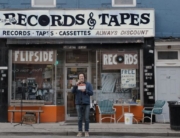The face on Burt’s Bees natural products is a pretty good likeness of the real-life beekeeper’s hirsute craggy face. Burt Shavitz’s beeswax was the original basis for the lip balm I use every day, and as the face of a growing international personal care products business with 400 employees and 170 products (bought by Clorox in 2007 for $925 million), he’s had an unusual life for a well-known hermit. He really does live with his dogs on 30 acres in a traditional Maine saltbox house with a wood stove, and he cuts more than enough wood to last all winter.
In Burt’s Buzz, director Jody Shapiro gradually draws out Burt’s story from rambling conversations as Shavitz shambles around his property and dutifully shows up at promotional events, from Target’s headquarters in Minnesota to fan meet-and-greets in Taiwan. He has a full-time factotum, Trevor, who keeps track of all the details of his life, and may be paid by the company, because Burt is now as recognizable a product symbol as Colonel Sanders, and the company wants to protect its image. He laconically recognizes the deal he’s made to be a symbol as the latest reinvention of himself.
The film’s first surprise is that Burt grew up as a Jewish boy in Great Neck, New York, living comfortably from the family’s graphic arts business founded by his grandfather. Always a loner, he biked around Long Island, and first adopted the name “Burt” after high school in 1953. After college and the army (as seen in many personal photographs), he legally changed his name to I. B. Shavitz, and he “left my world behind.” His brother Carl, with a neatly trimmed white beard, also reinvented himself around the same time, moving to England and now affects a bit of a British accent.
The next surprise: Burt was an urban photojournalist through the 1960s for New York City and national newspapers and magazines, roaming the city’s changing ethnic neighborhoods and grooving in the counterculture. (He has boxfuls of Photo League-quality black-and-white photographs of the likes of Malcolm X and Allen Ginsberg that should be preserved in a publicly accessible archive.)
Like Joni Mitchell sang, “And we’ve got to get ourselves/Back to the garden,” Burt headed upstate in the 1970s. A beekeeper happened to offer him all his equipment, and Burt went around collecting hives, amassing over two dozen filled with honey. “I realized I had it made. You can just use the same things over and over again, put it in a jar, and you’ve got $12.” With an inheritance from his grandfather, he went further back to the land up to Maine, and he shows where he sold honey in gallon containers by the side of the road (when customers woke him up in his truck), and then to his first retailer, a country store looking, as the proprietor explains, to expand into what would now be called locally sourced natural products.
And then his life changed again, and his story becomes a bit more problematical from different points of view, personalities, and lifestyles. In 1984, he picked up a hitchhiking mother of two young boys who had reinvented herself, hippie Roxanne Quimby. She moved in and took over, picking a local artist to etch him, his bees, and his dogs for their product labels, first for candles and dog biscuits. She turned his breakeven market stand into a multiproduct, multistate enterprise, and pushed him to be a traveling manager.
While she declined to be interviewed, which leaves a hole filled somewhat by excerpts from a CNBC profile of self-made millionaires, she suggested the participation of her son Lucas, who grew up with Burt: “She made him an icon, and it worked.” By the time she grew the business and moved it to larger quarters in North Carolina (there’s lots of shots of the factory line), Burt casually admits he was sleeping with other women while he was out on the road. But it was an affair with a much younger employee that finally and unevenly split their personal and business relationship in 1999. The financial and legal fury of a businesswoman scorned sounds straight out of a prime time soap, but has a loner who prefers to live in a simple house in the woods been cheated out of a fortune he never really wanted?
Now, the only appliance he has is an alarm clock because he does need to keep to a schedule for the public appearances as the trademark for the company he co-founded, though he is now only its image. In a twist on the rock ‘n’ roll cliché, he’s big in Taiwan—helped by an energetic public relations rep who nervously hopes he’ll stick to the script. Equally charming and annoying, his very quirkiness and stubbornness turns out to play to the company’s benefit, and he gets paid for just acting naturally.






Leave A Comment